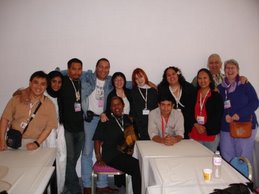Organisation name- Indigenous ICT Task Force (IITF)
Country- International
Organisation website-
Organisation type- Civil Society
Contact person for media interviews-
Family name: Nobrega
First name: Malia
Address: 2847 Waialae Ave #509 Honolulu, HI 96826
email: malianob@aol.com
telephone: (808) 286-5461
Except from Golden Book Description:
In December 2003, the first phase of the World Summit on the Information Society (WSIS) was held in Geneva to ensure that these benefits are accessible to all while promoting specific advantages in areas such as e-commerce, e-governance, e-health, education, literacy,
cultural diversity, gender equality, sustainable development and environmental protection.
Also in December 2003, the Government of Canada and the Aboriginal Canada Portal and Connectivity Working Group, in cooperation with Indigenous peoples, the United Nations Permanent Forum on Indigenous Issues and other UN Agencies, a number of member states and our Swiss and City of Geneva hosts, helped organize the Global Forum of Indigenous Peoples and the Information Society.
The Secretariat of the United Nations Permanent Forum on Indigenous Issues prepared a report on the Global Forum of Indigenous Peoples and the Information Society, which is available (in English only) on the Aboriginal Canada Portal, at the following URL:
http://www.aboriginalcanada.gc.ca/cac/international/discussion.nsf/fmenu_en.html?OpenForm
From these events came the WSIS Declaration and Plan of Action, as well as the Declaration and Plan of Action of the Global Forum of Indigenous Peoples and the Information Society. Together, these documents provide guidance to states, Indigenous peoples, UN agencies, non-governmental organizations, the private sector and academics interested in using new technologies to improve communications and the quality of life for Indigenous peoples around the world.
Article 15 of the WSIS Declaration states:
"In the evolution of the Information Society, particular attention must be given to the special situation of Indigenous peoples, as well as to the preservation of their heritage and their cultural legacy.”
In March 2005, the Government of Canada, the Aboriginal Canada Portal and Connectivity Working Group and the United Nations Permanent Forum on Indigenous Issues hosted the WSIS Indigenous Thematic Planning Conference for Tunisia. This was a global conference, with
participants from each of the world's regions, as recognized by the UN Permanent Forum.
The purpose of the WSIS Indigenous Thematic Planning Conference for Tunisia was to explore opportunities for: bridging the digital divide between Indigenous and non-Indigenous peoples; the effective use of information and communication technologies by Indigenous peoples for
sustainable development, poverty reduction, and other goals; and, for keeping the issue of connectivity front and centre on the international Indigenous agenda.
At the Tunisia phase of WSIS Indigenous delegates agreed to establish an Indigenous ICT Task Force to continue the work of WSIS in particular the aspirations of the indigenous parallel event in Tunis called Indigenous Peoples and the Information Society:
“Towards an International Indigenous Portal”
Indigenous connectivity should continue to be a focus for discussions at any number of international gatherings, including, but not limited to, the UN Permanent Forum, the UN Working Group on Indigenous Populations, and the Summit of the Americas.
SEE: http://www.itu.int/wsis/goldenbook/search/search-compute.asp
Subscribe to:
Post Comments (Atom)



No comments:
Post a Comment